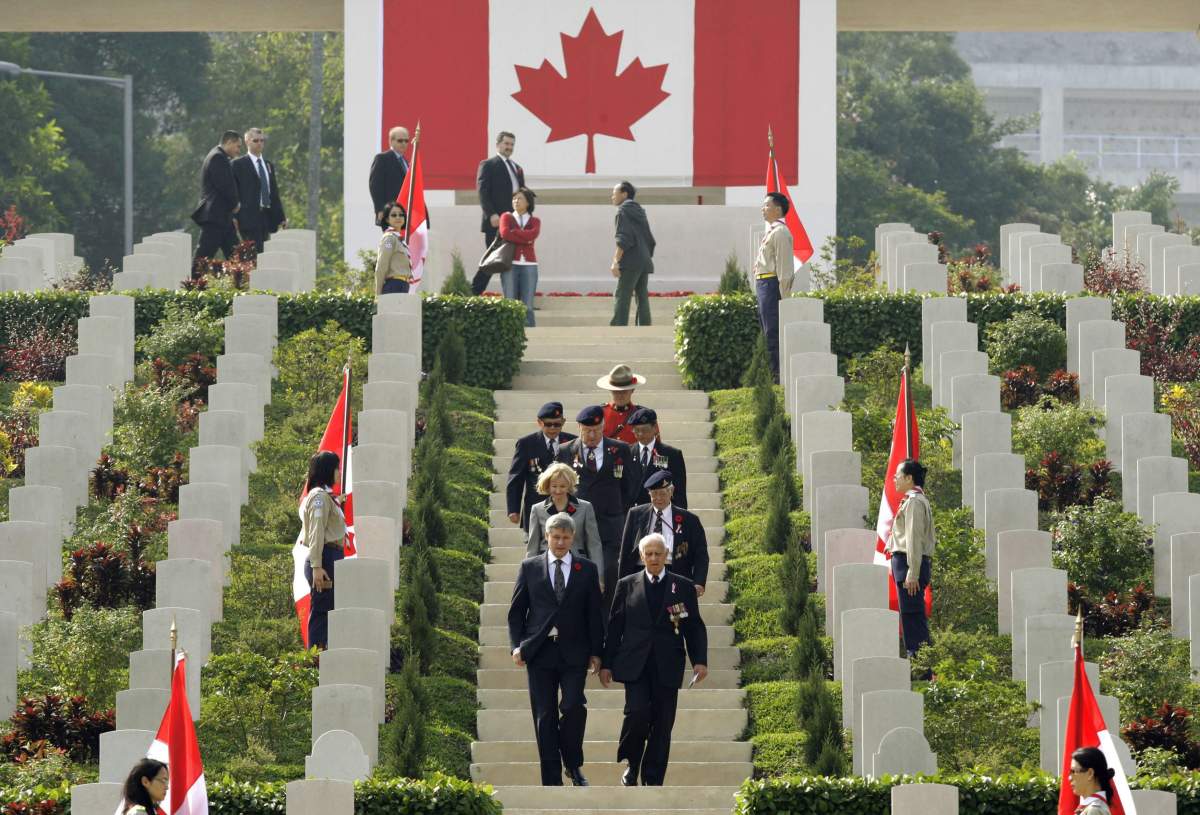Young, fresh-faced Canada sent 424,000 men overseas to fight in the First World War and nearly 61,000 of them were killed on foreign soil, far, far, far away from their homes in their 50-year-old country.

Those Canadians rest now in cemeteries all over Europe and their sacrifice helped forge a nation.
So it seems entirely appropriate that, on the 100th anniversary of the end of that great conflict, Canada’s prime minister, on the 11th hour of the 11th day of the 11th month of this year, should spend the day in France, where many of the greatest battles Canadians fought and died in were waged.
Not only that — though that reason alone would be sufficient for a Canadian prime minister to be overseas this year — but French President Emmanuel Macron has invited Prime Minister Justin Trudeau, British Prime Minister Teresa May, Belgian Prime Minister Charles Michel, and U.S. President Donald Trump to join him and more than 70 other world leaders in Paris for a special 100th anniversary Armistice Day service Sunday, followed by a Peace Forum, where those leaders will discuss issues of international security.
Just as Prime Minister Robert Borden insisted Canada should join the family of nations at the Paris peace talks in 1919, so too should Canada join the community of nations in Paris this year.
Back in Canada, Defence Minister Harjit Sajjan will represent the Government of Canada at the 2018 National Remembrance Ceremony.
And yet there are some scowls, mostly on social media, from people who think Trudeau is wrong to miss Sunday’s National Remembrance Day ceremony in Ottawa.
Well, if he is wrong, then his predecessor, Stephen Harper, must have been as well.
Harper was out of Ottawa and missed the National Remembrance Day ceremony in the nation’s capital in 2010, 2012, and 2013.
In 2010, Harper marked the day in Seoul, South Korea, where he joined the prime ministers of the United Kingdom, Australia and the president of South Korea at the Korean War Memorial for a remembrance service.
In 2012, Harper stood among the gravestones of the Sai Wan War Cemetery in Hong Kong to honour the 228 Canadians buried there who died defending the city during the Second World War.
in 2013, Harper travelled to Morrisburg, Ont., for a Remembrance Day event on a War of 1812 battlefield.

Get daily National news
Harper was in Ottawa for Remembrance Days in 2006-2009 and in 2011.

WATCH: Justin Trudeau visits Vimy, France
As for Trudeau, he spent his first two Remembrance Days as prime minister in Ottawa but was in Vietnam last year on November 11.
What is it that took Harper and Trudeau to Asia for three Remembrance Days in the last decade?
The answer is the APEC summit.
Canada joined the joined the Asia-Pacific Economic Cooperation (APEC) group of Pacific Rim countries in 1989, a group which has its annual summit of heads of government every year right about this time.
And they have correctly judged that, just as Canadians have fought and died in theatres of war and conflict all over the world, it is appropriate for the Canadian prime minister to honour and acknowledge their sacrifice where ever the Canadian prime minister happens to be in the world on November 11, while he is doing the country’s business. It is the act of remembrance, not the location of that act, that is the important thing.
Just once, so far as I can remember, did a Canadian prime minister cut short their attendance at an APEC summit to make it back to Ottawa for the national Remembrance Day ceremony and that was in 2014, when Harper left the summit that year in Beijing a day early to get back to Ottawa. The 2014 Remembrance Day ceremony was a particularly special one, coming less than a month after Corporal Nathan Cirillo was shot and killed at the very spot — the National War Memorial — where the Remembrance Day ceremony is held.
In any event, the presence of Canadian prime minister at the National Remembrance Day is not nearly as crucial as the presence of the Governor General who represents the monarch and head of state in whose name Canada’s fighting men and women give their service and who is also Canada’s Commander-in-Chief.
It is the Governor General, not the prime minister, who always presides over the National Remembrance Day ceremony and has done so for decades.
This year, the current Governor General, Julie Payette, has had an extremely busy Remembrance Week. On Saturday she attends armistice ceremonies in Mons and Le Roeulx, Belgium, where Canadians fought and fell 100 years ago. She will then fly overnight to preside over the National Remembrance Day Ceremony Sunday morning at the National War Memorial.
Watch below: Governor General Julie Payette in 2017












Comments
Want to discuss? Please read our Commenting Policy first.